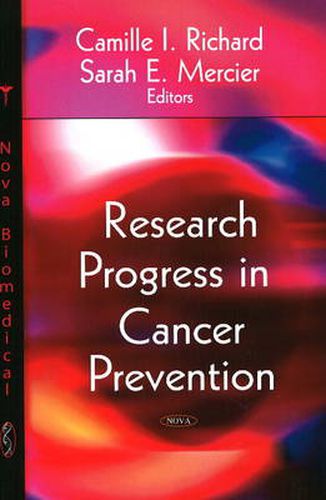Readings Newsletter
Become a Readings Member to make your shopping experience even easier.
Sign in or sign up for free!
You’re not far away from qualifying for FREE standard shipping within Australia
You’ve qualified for FREE standard shipping within Australia
The cart is loading…






Cancer has a complex aetiology, probably due to a sophisticated interaction between the genetic endowment of individuals and environmental risk factors. The continuing magnitude and severity of cancer as a major health problem renders cancer prevention an important area in the field of cancer research. Developments in cancer prevention have benefited from the recent advances in molecular and cellular biology. Several specific molecules have been identified as promising targets for cancer prevention and numerous agents have been synthesised, developed and tested to modulate the functions of these molecules. Given the ongoing advances in our understanding in the genesis of cancer, it is possible to develop new and better agents on a more mechanistic basis. The most striking examples for this mechanism-based approach for cancer prevention include: the role of inducible cyclooxygenase-2 (COX-2) in colon cancer and the preventive effects of COX-2 inhibitors (e.g., celecoxib); the involvement of oestrogen receptors in breast cancer and the development of selective estrogen receptor modulators (e.g., tamoxifen and raloxifene) for the prevention of this malignancy; and the function of androgen in prostate cancer and the use of 5-a-reductase inhibitors (e. g., finasteride) as a preventive measure. This book provides leading edge research from around the globe on this field.
$9.00 standard shipping within Australia
FREE standard shipping within Australia for orders over $100.00
Express & International shipping calculated at checkout
Cancer has a complex aetiology, probably due to a sophisticated interaction between the genetic endowment of individuals and environmental risk factors. The continuing magnitude and severity of cancer as a major health problem renders cancer prevention an important area in the field of cancer research. Developments in cancer prevention have benefited from the recent advances in molecular and cellular biology. Several specific molecules have been identified as promising targets for cancer prevention and numerous agents have been synthesised, developed and tested to modulate the functions of these molecules. Given the ongoing advances in our understanding in the genesis of cancer, it is possible to develop new and better agents on a more mechanistic basis. The most striking examples for this mechanism-based approach for cancer prevention include: the role of inducible cyclooxygenase-2 (COX-2) in colon cancer and the preventive effects of COX-2 inhibitors (e.g., celecoxib); the involvement of oestrogen receptors in breast cancer and the development of selective estrogen receptor modulators (e.g., tamoxifen and raloxifene) for the prevention of this malignancy; and the function of androgen in prostate cancer and the use of 5-a-reductase inhibitors (e. g., finasteride) as a preventive measure. This book provides leading edge research from around the globe on this field.